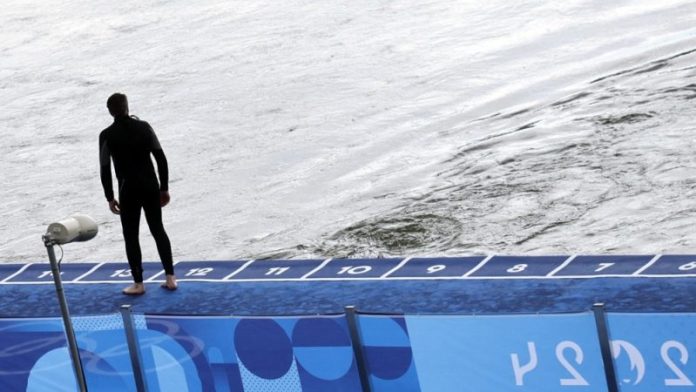Paris authorities and the Summer Olympics Organising Committee on Wednesday allowed the triathlon competition to take place. They assured that the water in the Seine had been cleared of sewage and was now safe to swim in.
An Olympic triathlete vomited on live television after swimming in the Seine River in Paris on Wednesday, raising concerns about the level of pollution in the river. The event was initially postponed on Tuesday morning after test results showed the water was “too polluted,” but it ended up starting 24 hours later than scheduled.
Canadian triathlete Tyler Mislawchuk, who placed ninth, threw up shortly after completing the challenging race, which consisted of a 1.5-kilometre swim, a 40-kilometre bike ride and a 10-kilometre run. Television cameras captured this unpleasant scene, as well as many other athletes lying on a mat trying to catch their breath.
Kazakhstan’s Ekaterina Shabalina also admitted to throwing up after the Seine swim.
Mission to clean up the Seine River
The French government has spent €1.4bn (£1.18bn) to make the river safer in preparation for the Olympics. A World Triathlon statement released on Tuesday said the following:
“Following a water quality meeting held at 3.30 a.m. on July 30, attended by Paris 2024, World Triathlon, their technical and medical delegates, the International Olympic Committee, Météo France, the City of Paris and the prefecture of the Ile-de-France region involved in the water quality tests, it was decided to postpone the men’s triathlon competition, which was due to take place at 8 a.m. on July 30.”
Swimming in the Seine has been banned for more than a century due to high levels of pollution and the possibility of becoming ill by accidentally swallowing the water. In an attempt to avoid possible health risks, some athletes even go to extreme measures: for example, American athlete Seth Rider said he does not wash his hands to develop a resistance to bacteria. He claimed:
“In preparation for this race, I knew there was going to be some E. coli exposure. So I’ve been trying to increase my E. coli threshold by exposing myself to a bit of E. coli in day-to-day life.”
Belgian athletes shocked by Seine
A Belgian Olympic champion competing in the women’s triathlon final “felt and saw things we shouldn’t think too much about” during her swim in the Seine at the Paris 2024 event.
Triathlete Jolien Vermeylen, 30, who finished 24th in the final with a time of 1:59:44, told Dutch TV channel VTM after Wednesday’s competition that she knew the river had been deemed safe enough to compete in after last-minute tests but did not want to think too much about the water quality. She said:
“I drank a lot of water, so we’ll know tomorrow if I’m sick or not. It doesn’t taste like Coca-Cola or Sprite, of course.”
The level of E. coli in the river was 10 times higher than the permissible standards set by sports federations in June. However, after tests on Wednesday morning, the bacteria level was deemed safe enough to continue swimming.
Anne Hidalgo, the mayor of Paris, recently highlighted the cleanup work by swimming in the river. She said:
“It’s sweet and wonderful and the result of a lot of work. I remember at the very beginning in 2015, when we began our campaign for the Games, the international triathlon federation said: ‘Why not a triathlon in the Seine? Will athletes be able to swim in the Seine?” Today we can say they can.”
Triathlon Results at Paris Olympics
Alex Yee won the men’s triathlon, securing a fifth gold medal for Team Great Britain at the Olympic Games. He improved on the silver medal he won in Tokyo three years ago after working hard to overcome a 15-second gap to New Zealand’s Hayden Wilde. In the women’s event, Frenchwoman Cassandre Beaugrand won the women’s event from the leading four, with Great Britain’s Beth Potter taking bronze.
The athletes will remember these medals for the rest of their lives. And not only because they are now Olympic champions, but also because of the intrigue and postponement of triathlon competitions due to the pollution of the Seine.
